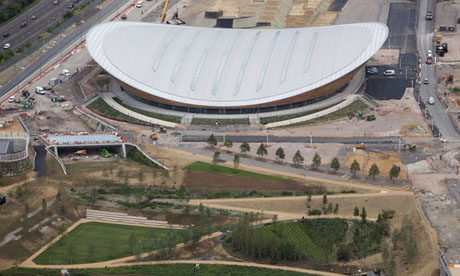Olympics organisers urged to ban tents for fear of Occupy-style protests

An aerial view of the Velodrome, with construction completed on the venue with one year to go until the London 2012 Olympic Games. Photograph: Anthony Charlton / ODA
The home secretary has vowed to clamp down on the threat of “encampment-style” protests within Olympic venues, urging organisers to ban ticket holders from bringing tents as a condition of entry.
The recent Occupy protests at St Paul’s Cathedral and elsewhere have raised concerns that similar activities could be planned within the Olympic park or other Games venues.
But the new clampdown could bring the government into conflict with London 2012 organisers, who appear likely to include tents on their “restricted” rather than “prohibited” list of items.
Theresa May told a Royal United Services Institute conference on Olympic security that the government had “clarified and strengthened” its policy on “encampment-style protests inside Olympic venues”.
She said there would be strict security and screening measures to stop the “necessary equipment” being brought into Olympic venues, that London 2012 organisers would be told to take “swift action” against any that did get through, and that police would be urged to use “all available powers” to remove camps and equipment.
“I have explained this new policy to the London Organising Committee for the Olympic and Paralympic Games [Locog], as the event hosts for the Olympics,” said May.
“Its success will depend on Locog adding tents and related equipment to the list of items prohibited from being brought into Games venues. I trust they will now do so. I have also stressed to the police that they must act swiftly in support of Locog should they receive a complaint.”
But when Locog publishes its list of banned and restricted items within the next month, it is likely tents will be included in restricted section rather than prohibited altogether.
While giving its security guards the power to remove tents if necessary, Locog is keen to avoid a situation where someone carrying a tent for legitimate reasons is denied entry or has it confiscated.
A spokeswoman said: “Locog has already given careful consideration to the threat of encampments and disruptive protests at our venues during Games time. The conditions of entry for spectators are clearly stated in our ticketing terms and conditions and entitle us to prohibit items from being brought into venues and to remove persons from venues where necessary.
“This is to ensure that sport can continue and be enjoyed by all. We are also taking steps to ensure we can take speedy legal action to protect our rights. We will continue to work closely with the police and other agencies on our policies and plans for preventing, and if necessary addressing, encampments and other disruption to the Games.”
The Met’s assistant commissioner in charge of security for the Olympics, Chris Allison, has said the right to protest outside venues will be protected during the Games, but he urged protestors to make early contact with police.
May also revealed that 97 arrests had been made by Operation Podium, the Met unit targeting organised crime around the Games. The arrests include fraud and ticket-touting offences.
She also warned of the “strong possibility” of threats from cyber criminals who may seek to target the Games and its sponsors.
“We are aware of the threat from so called hacktivist groups,” she said. “These groups may attempt to target the Games and may also attack the websites of high-profile sponsors associated with the Games.
“We already have our own robust plans in place to deal with a cyber attack against Games systems. And we are now also working with industry to strengthen their ability to defend themselves from cyber attacks.”
During the Beijing Olympics, there were a reported 12m cyber attacks a day on websites and technology systems.
Despite concerns about the rising cost and spiralling numbers involved in the security operation, which will include 23,700 security guards inside venues and up to 12,000 police outside on the busiest days, May said the plans were firmly on track.
“It is because of this unprecedented challenge that we have undertaken such thorough planning, have made such significant investments and will carry out such extensive testing and exercising,” she said.
“We must now grasp the opportunity that 2012 represents to show the whole world all that is great about Great Britain.”
guardian.co.uk © Guardian News &
Media Limited 2010
Published via the Guardian News Feed plugin for WordPress.
